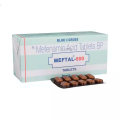Home / Categories / MEFPAS-500MG

MEFPAS-500MG
(10TX10S)
MEFENAMIC ACID-500MG
NSAIDS-ANTIPYRETIC/ANALGESICS
QMED FORMULATION PVT.LTD
Product Details
Mefenamic Acid
A to Z Drug Facts
Mefenamic Acid
Action
Indications
Contraindications
Route/Dosage
Interactions
Lab Test Interferences
Adverse Reactions
PrecautionsPatient Care Considerations
Administration/Storage
Assessment/Interventions
Patient/Family Education
(MEH-fen-AM-ik acid)Ponstel,  PonstanClass: Analgesic/NSAID
PonstanClass: Analgesic/NSAID
 Action Decreases inflammation, pain and fever, probably through inhibition of cyclooxygenase activity and prostaglandin synthesis.
Action Decreases inflammation, pain and fever, probably through inhibition of cyclooxygenase activity and prostaglandin synthesis.
 Indications Relief of moderate pain lasting < 1 wk; treatment of primary dysmenorrhea. Unlabeled use(s): Treatment of sunburn, migraine (acute attack), PMS.
Indications Relief of moderate pain lasting < 1 wk; treatment of primary dysmenorrhea. Unlabeled use(s): Treatment of sunburn, migraine (acute attack), PMS.
 Contraindications Patients in whom aspirin, iodides or any NSAID has caused allergic-type reactions; preexisting renal disease; active ulceration or chronic inflammation of GI tract.
Contraindications Patients in whom aspirin, iodides or any NSAID has caused allergic-type reactions; preexisting renal disease; active ulceration or chronic inflammation of GI tract.
 Route/Dosage
Route/Dosage
Acute Pain
ADULTS & CHILDREN > 14 YR: PO 500 mg, followed by 250 mg q 6 hr prn. Usually not used longer than 1 wk.
Primary Dysmenorrhea
ADULTS & CHILDREN > 14 YR: PO 500 mg, followed by 250 mg q 6 hr starting with onset of bleeding and associated symptoms.
 Interactions
Interactions
Anticoagulants: Increased risk of gastric erosion and bleeding. Cyclosporine: Nephrotoxicity of both agents may be increased. Cytochrome P450: Exercise caution when coadministering mefenamic acid with drugs known to inhibit the isoenzyme 2C9. Lithium: Serum lithium levels may be increased. Methotrexate: Increased methotrexate levels. Salicylates: Additive GI toxicity.
 Lab Test Interferences May cause prolonged bleeding time or false-positive reaction for urinary bile using diazo tablet test.
Lab Test Interferences May cause prolonged bleeding time or false-positive reaction for urinary bile using diazo tablet test.
 Adverse Reactions
Adverse Reactions
CV: Edema; weight gain; CHF; altered BP; palpitations; chest pain; radycardia; tachycardia. CNS: Headache; vertigo; drowsiness; dizziness; insomnia. DERM: Rash; urticaria; purpura. EENT: Blurred vision; tinnitus; salivation; glossitis. GI: Diarrhea; dry mouth; vomiting; abdominal pain; dyspepsia; GI bleeding; ausea; constipation; flatulence. GU: Hematuria; proteinuria; dysuria; renal failure. HEMA: Decreased hematocrit; bleeding; neutropenia; leukopenia; pancytopenia; osinophilia; thrombocytopenia. HEPA: Mild elevations in liver function test results. RESP: Bronchospasm; laryngeal edema; rhinitis; dyspnea; pharyngitis; emoptysis; shortness of breath. OTHER: Autoimmune hemolytic anemia may occur if used long term.
 Precautions
Precautions
Pregnancy: Category C. Lactation: Undetermined. Children: Not recommended for children < 14 yr. Elderly: Increased risk of adverse reactions. Diarrhea: If diarrhea occurs, reduce dosage or temporarily discontinue. GI toxicity: Bleeding, ulceration, or perforation can occur at any time, with or without warning symptoms. Hypersensitivity: May occur; use with caution in aspirin-sensitive individuals because of possible cross sensitivity. Rash: Promptly discontinue if rash develops. Renal effects: Acute renal insufficiency, interstitial nephritis, hyperkalemia, hyponatremia and renal papillary necrosis may occur. Renal impairment: Lower doses may be necessary.
PATIENT CARE CONSIDERATIONS
 Administration/Storage
Administration/Storage
- Administer with meals, followed by full glass of water or milk to avoid GI and esophageal irritation. May be given with antacids if stomach upset occurs.
- Exercise caution when initiating treatment in patients with considerable dehydration. Rehydrate patients first and then start therapy with mefenamic acid.
- Store at room temperature in tightly closed, light-resistant container.
 Assessment/Interventions
Assessment/Interventions
- Obtain patient history, including drug history and any known allergies. Note chronic alcohol use, fluid retention, nasal polyps, bronchospastic disease or hypersensitivity to aspirin or NSAIDs.
- Weigh patient daily if fluid retention is a concern.
- Monitor carefully for hypersensitivity. Note any ecchymosis or rash.
- Monitor renal and liver function and blood studies throughout treatment.
- Monitor for diarrhea or blood in stools. If diarrhea occurs, notify physician. Dosage may need to be reduced or drug temporarily withheld.
- Notify physician if stomach pain develops or continues.
OVERDOSAGE: SIGNS & SYMPTOMS Acute renal failure, coma, grand mal seizures, muscle twitching, status epilepticus
 Patient/Family Education
Patient/Family Education
- Inform patient not to use drug for more than 1 wk. If given for dysmenorrhea, instruct patient to begin taking drug with onset of bleeding and associated symptoms.
- Warn patient about potential for bleeding and advise to notify other health care professionals that drug is being taken.
- Advise patient to discontinue medication if rash develops and to contact physician.
- Instruct patient to report these symptoms to physician: rash, visual problems, dark stools, decreased urinary output, persistent headache or stomach pain and unusual bruising or bleeding.
- Advise patient to avoid intake of alcoholic beverages.
- Instruct patient that drug may cause drowsiness and to use caution while driving or performing other activities requiring mental alertness.
- Caution patient to avoid prolonged exposure to sunlight and to use sunscreen or wear protective clothing to avoid photosensitivity reaction.
- Instruct patient not to take otc medications, including aspirin and ibuprofen or other prescription drugs, without consulting physician.
Books@Ovid
Copyright © 2003 Facts and Comparisons
David S. Tatro
A to Z Drug Facts

